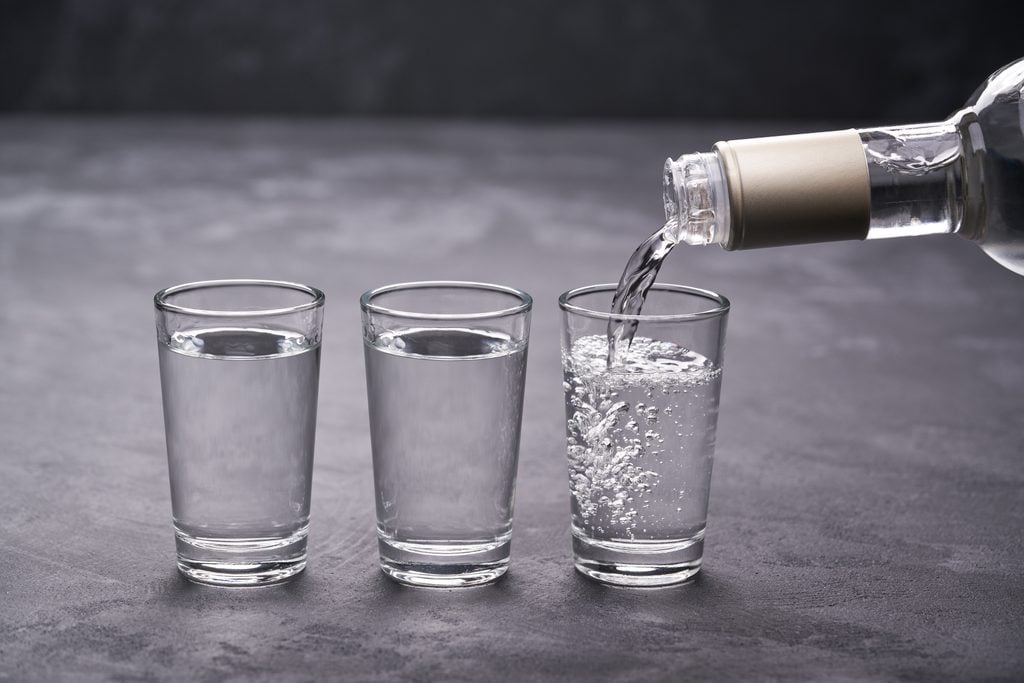Does Vodka (and Other Alcohol) Freeze?
Updated: Mar. 13, 2024

Beer and wine will freeze in the freezer within hours—so why doesn't vodka freeze, even after months? Why does alcohol freeze at different temperatures?
When it comes to the purposes of kitchen appliances, it doesn’t get much more straightforward than the freezer. You put things in there, and they freeze. Well, most things. Certainly most liquids. But alcohol is a different story! You may have noticed that if you put a bottle of vodka in your freezer, you can take it out months later and it’ll still slosh around. Does vodka freeze? And if not, why not? And does alcohol freeze at all?
Does vodka freeze?
Wondering why your bottle of vodka won’t freeze, no matter how long you leave it in the freezer? No, there’s nothing wrong with your freezer. So, why doesn’t vodka freeze? Well, it has to do with the freezing point of alcohol, which is far lower than the traditional “freezing point” you’re most familiar with, such as water (32 degrees Fahrenheit). Pure ethanol alcohol needs to be -173 degrees Fahrenheit to freeze.
At around 40 percent alcohol (80 proof), vodka has a freezing point that hovers at around -16 degrees Fahrenheit. And while putting it in the freezer will affect it somewhat, it won’t freeze solid in your traditional freezer. “When alcohol freezes, it becomes more viscous and thicker because the water in it freezes, but the actual alcohol has a lower freezing point and it does not freeze as quickly or easily,” explains Amy Leigh Mercree, holistic health expert and bestselling author of ten books including The Mood Book. “The freezing process is also hindered by the average household freezer; the typical freezer is about 0 degrees Fahrenheit.” Is your freezer at the right temperature?
So, no, no matter how long you leave vodka in your regular freezer, it will never freeze solid—your freezer is about 16 degrees too warm for that to happen. ThoughtCo. points out that an industrial freezer, or liquid nitrogen, could certainly do the job.
Does alcohol freeze at all?
Yes, it does—but that doesn’t mean you should pop all of your booze into the freezer indefinitely. You might have learned this lesson if you put a bottle of beer or wine in your freezer for a long time, only to have the glass crack or the top even pop off as it froze. Why does alcohol freeze at different temperatures?
Because all alcohols are a combination of alcohol and water, the freezing points of different alcohols vary based on the amounts of alcohol and water they contain. Beer and wine, often with alcohol percentages in the single digits or teens, freeze quickly. As opposed to hard liquor, they contain much more water, and, of course, water freezes just fine in the freezer. So stick a bottle of beer or wine in the freezer, and it’ll probably freeze within a couple of hours. But this could actually cause the freezing liquid to expand, potentially cracking the glass, so beer and wine are things you should never keep in your freezer (at least not for longer than just a brief chill).
Why don’t we freeze other liquors as much?
Vodka isn’t the only type of liquor with an alcohol content that gives it a freezing point colder than most freezers. “This explains why some people like to enjoy a nice cold shot of vodka straight from the freezer,” Mercree explains, adding that liquors like whiskey and rum have comparable amounts of alcohol, too. However, these other types of liquors are not stored in the freezer by people as much as vodka. “Freezing alcohol tends to diminish the flavor and scent,” Mercree explains. “With vodka that doesn’t really matter, but with other more flavorful alcohols that would be less desirable.” You can keep them in the freezer, but they might not taste quite as potent.
